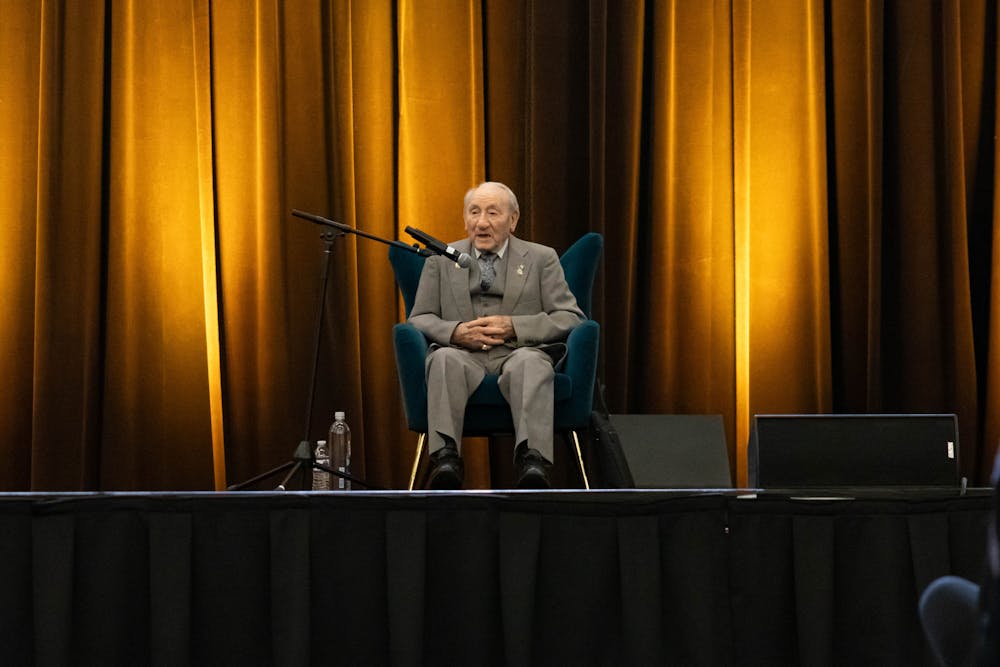1-4-2-5-8-4
Those were the numbers forcefully tattooed on Joseph Alexander's arm after he was taken in a boxcar by the Nazis to the Auschwitz concentration camp during World War ll.
"From that moment on, you had no name anymore," Alexander, a 101-year-old Holocaust survivor, said. "That was your name."
Alexander showed the audience his tattoo as a way to bring his history alive.
On Feb. 18, Alexander spoke to ASU students and other attendees on the Tempe campus to share his personal experience of living through 12 different concentration camps.
The event took place at the Student Pavilion and was hosted by the Jewish student organization Chabad at ASU and the Executive Director Rabbi Shmuel Tiechtel.
In 1939, at the start of the war, Alexander was forced to move with his mother, father, brother and two sisters from a small town in Poland to the largest ghetto in Warsaw.
"Life in the ghetto, you can't even imagine how terrible, how bad it was," Alexander said.
Throughout the speech, Alexander shared his near-death interaction with Josef Mengele, a Nazi doctor at the Auschwitz camp who conducted human experiments and determined the fate of several people, including Alexander. During a lineup when Alexander first arrived at Auschwitz, Mengele selected people to go to the left, where they would then be taken to the gas chambers.
Alexander was one of those selected. Since it was late at night, he was able to sneak to the other side when nobody was looking, saving his own life.
"If I would have listened to him and gone to the left, I wouldn't be here to talk to you," he said. "To me, it was like I was reborn again."
After the war, Alexander was unable to locate any of his immediate family and lived in Germany for four years before immigrating to New York on May 30, 1949, through a sponsorship by a Jewish organization.
Alexander now lives in California and travels around the nation to speak to hundreds of thousands of students and other groups of people.
Alexander mentioned that in his time speaking to middle and high school students, he has been told many have never heard about the Holocaust.
"A few survivors are left. We are the ones that have to let them know what happened," Alexander said.
During the questionnaire after his speech, a student asked Alexander what he held onto during the difficult times.
"I never lost faith," he said. "In all of that, I never stopped believing in God."
"His life is just incredible," said Dotan Barshishat, a freshman studying business, after Alexander's speech. "Out of all of the speakers I've heard, it has never been like that."
Tempe Mayor Corey Woods, one of the many in attendance, said he was honored to have witnessed Alexander share his experiences in person, and it is important to continue educating people to avoid the repetition of the "same mistakes of the past."
"We just have to make sure that we rise up against hate and ensure that something like the Holocaust never actually happens again," Woods said. "That is why it is so critically important that we always have a true, accurate accounting of history."
Woods was one of hundreds of people attending the event. The event hosted people of all ages, from young children to senior citizens, all drawn into Alexander's emotional experience.
Eyan Weissbluth, a student studying Earth and space exploration, said he felt incredible emotion hearing Alexander be so willing to speak on his life in such detail to educate on the damage of the Holocaust.
"I think it shows how important education is," Weissbluth said. "People today ... see it as 'If I stand up for one group, I have to be against another group' and it's pretty sad. I think Mr. Alexander accentuates the idea that you don't have to be anti to be pro."
Edited by Grey Gartin, Alysa Horton and Angelina Steel.
Reach the reporters at and kehumble@asu.edu and dgoacher@asu.edu and follow @kennedihumble @DameTimeNews on X.
Like The State Press on Facebook and follow @statepress on X.




